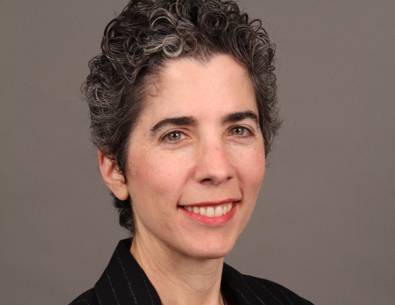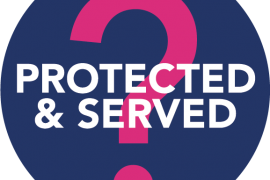
Testimony Before the President's Policing Task Force Hearings
Blog Search
Lambda Legal's Deputy Legal Director Hayley Gorenberg testified before the President's Task Force on 21st Century Policing on January 30, 2015. These were her comments.
Lambda Legal's policing and criminal justice work includes the landmark Supreme Court decision striking down all sodomy laws in the United States; challenges to "sting" operations targeting gay and bisexual men; advocacy to end criminalizing HIV status, and to end use of condoms as evidence of prostitution-related crimes; cases on transgender prisoners' access to medical treatment and safety in custody; work to interrupt the “school-to-prison pipeline”; and a recent national survey of thousands of lesbian, gay, bisexual, transgender, and gender-nonconforming people and people living with HIV, focused on the communities' experience with the criminal justice system and policing.
Federal investigations of police departments and data from sister organizations and Lambda Legal’s own survey of LGBT people and people living with HIV, Protected and Served? tell us law enforcement agents engage in LGBT-targeted discrimination, harassment, and even sexual assault.
“Police neglect” also jumps off our survey pages. Of Lambda Legal’s respondents who said they had lodged complaints about police misconduct in the past five years, almost three-quarters said their complaints were not fully addressed. Many told Lambda Legal police neglected their reports of assault. Of those who reported intimate partner violence, nearly half of African-American, transgender and gender-nonconforming respondents, and more than half of HIV-positive respondents told us police failed to address their reports.
These Are the Highlights of Our Recommendations
LGBT-inclusive anti-profiling measures: expand the Department of Justice’s new profiling Guidance for Federal Law Enforcement Agencies on the Use of Race, Ethnicity, Gender, National Origin, Religion, Sexual Orientation and Gender Identity to reach all federal and federally funded law enforcement.
And consistent with the recommendation of the Presidential Advisory Commission on HIV/AIDS, the Administration should issue guidance to law enforcement condemning use of condoms as evidence of intent to engage in prostitution or sex trafficking.
A note about criminalizing condom possession: Policing agencies don’t have a public health agenda at their core. So we need help from other quarters of government to move them. And there’s no reason to carve out sex trafficking—far from it. We work with representatives of trafficking victims who confirm that criminalizing condoms keeps severely abused people from accessing a simple measure that could help protect them--even as they are trafficked.
Next: We need to build culturally competent police forces
The Administration should ensure police departments include sexual orientation, gender identity and expression, and HIV status in nondiscrimination policies, guidelines, and patrol guides.
We need mandatory cultural competency training on LGBT and HIV issues, with ongoing community involvement. We know from experience and current events that training should address implicit bias. And it should take full advantage of existing police structures. For example, underscore the importance by including these subjects in sessions that require rotating officers from street duty, rather than merely in brief pre-roll call sessions, and incentivize them through systems that award points toward upcoming exams for successful completion.
Why call out implicit bias? We’re addressing police diversity and understanding. In our streets, police hold much more power than the rest of us. But we are not safe unless police power is informed. I say “informed,” because researchers who study our brains tell us they are “designed to be biased,” largely toward those with whom we are most familiar. But when a police officer has a gun in hand, training to counter this bias is a matter of life and death. So color, sexual orientation, gender identity and other distinguishing characteristics require interventions, if police who don’t share those characteristics are to protect and serve.
A key recommendation for community safety is establishing nationwide standards for treatment of LGBT and gender-nonconforming people in police custody
Without policies barring discrimination and clear policies for determining gender during arrest processing and placement in police custody, LGBT people are often subjected to unlawful, unnecessary and humiliating searches to assign gender, to discrimination and abuse, and to unsafe placement. The Department of Justice should prohibit police searches to determine genital characteristics.
Next: Ending Sexual Harassment and Assault by Law Enforcement Officers
Sexual harassment and assault by law enforcement officers is pervasive and often undetected. We need stronger policies to prevent, address, and document sexual harassment, abuse, and assault by local law enforcement agents. Without good policy to protect them, the people we serve are in danger in custody. Anywhere in custody. So we ask that the Department of Justice clarify that the definition of “lock-ups” in the Prison Rape Elimination Act regulations includes police cars and other temporary detention.
Next: Collecting Information to Promote Safety and Eliminate Risk
We’re wrestling with the question of numbers. Data. We know the old saw that if we’re not counted, we don’t count. But in the face of overwhelming reports of police abuse and concerns about what will be communicated from government records of sexual orientation or gender identity, we are concerned that demands from police to disclose during street and custodial interactions increase danger. Bottom line: to protect the people with whom they come in contact, law enforcement agents should not be charged with mandatory data collection regarding sexual orientation or gender identity. People should have the option to provide information relating to sexual orientation or gender identity, for purposes of safer placements in custody. Yet we agree we need more numbers. So we ask that questions about mistreatment of LGBT and gender-nonconforming people be added to the Bureau of Justice Statistics Police Contact Survey and the Office of Victims of Crime National Intimate Partner and Sexual Violence Survey.
Finally: Policing Young People in Schools: Interrupting the “School-to-Prison Pipeline”
Lots of our kids see lots of police. Every day. The skyrocketing placement of school safety agents tasked from local police departments to schools has diverted school discipline issues from the principal’s office to police handcuffs. Research shows LGBT and gender-nonconforming young people are disproportionately punished by authorities. Lesbian, gay and bisexual adolescents are about 40 percent more likely than other teens to be punished and policed. These disparities do not correlate to rates of misbehavior.
We ask that the Administration ensure that police and schools limit interventions that push students out of educational environments to conduct that poses a serious safety threat to students or staff. And if police are to be routinely present in schools, they should be integrated into the educational community and used to connect students to community resources. That’s not what’s happening now, and it’s endangering our young people.




